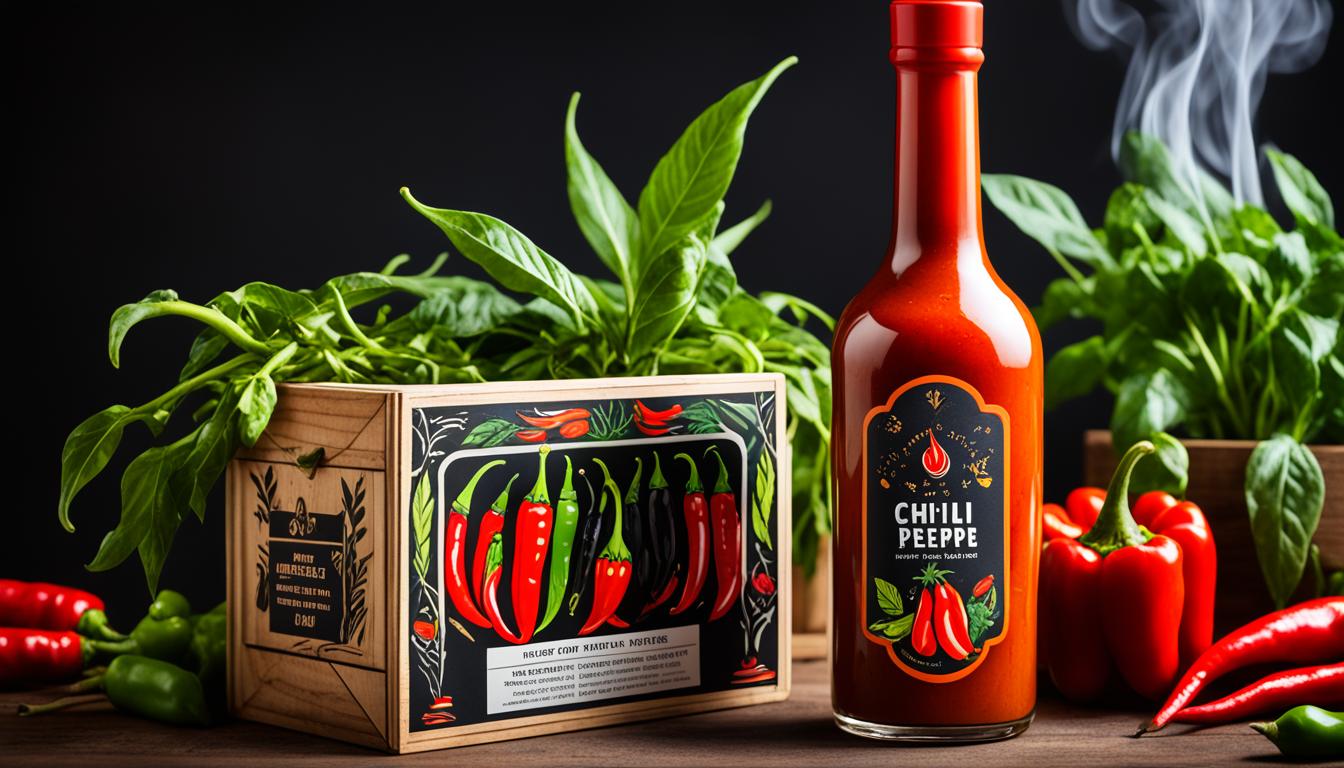The hot sauce industry has seen significant growth in recent years, with a forecasted revenue of $1.3 billion in 2017. If you’re passionate about spicy flavors and want to turn that passion into a business, starting a hot sauce business might be the perfect venture for you. In this guide, we will walk you through the essential steps to start a hot sauce business, from finding your niche to marketing your products.
Key Takeaways:
- Find your niche within the hot sauce industry to differentiate yourself from competitors.
- Gather high-quality ingredients, preferably fresh and locally sourced, for the best flavor in your sauces.
- Develop a unique hot sauce recipe that showcases your flavors and sets you apart.
- Test your sauce extensively to gather feedback and ensure it meets the taste and quality standards.
- Get your hot sauce business up and running by registering, obtaining licenses, and securing business insurance.
Find Your Niche
Before diving into the hot sauce business, it’s important to find your niche. Consider what sets your hot sauce apart from others and do some market research to identify gaps in the market.
All-Natural Hot Sauce
If you are passionate about providing customers with the healthiest option, consider creating an all-natural hot sauce. By using organic ingredients and avoiding additives or preservatives, you can cater to health-conscious individuals looking for a clean and flavorful hot sauce.
Vegan Hot Sauce
Appeal to the growing number of people adopting a vegan lifestyle by creating a delicious vegan hot sauce. Ensure that your hot sauce does not contain any animal products or by-products, making it suitable for vegans and vegetarians alike.
Locally Sourced Hot Sauce
Show your commitment to supporting local businesses and reducing carbon footprint by sourcing your ingredients locally. Create a unique selling point by highlighting the origins of your ingredients and supporting local farmers and suppliers.
Super Spicy Hot Sauce
For those who crave a fiery kick, develop a super spicy hot sauce that will satisfy even the most daring chili lovers. Experiment with different chili varieties and spice levels to create intense flavors that will leave customers reaching for more.
Mild Hot Sauce
Not everyone enjoys extreme heat, so consider crafting a milder hot sauce option that appeals to individuals who prefer a more subtle tang. By striking a balance between flavor and heat, you can attract a wider customer base.
Fruit-Based Hot Sauce
Inject a burst of fruity sweetness into your hot sauce by incorporating fruits such as mango, pineapple, or peach. This unique twist will add depth and complexity to your hot sauce, appealing to those who enjoy a tropical flavor profile.
Limited Edition Hot Sauce
Create a sense of exclusivity and excitement by releasing limited edition hot sauces, featuring unique flavors or collaborations. By offering limited quantities, you can create a sense of urgency and appeal to customers who enjoy collecting special edition products.
Finding your niche will help you stand out in a crowded market and attract a loyal customer base. Once you have determined your niche, you can move on to the next steps of starting your hot sauce business.
Gather Your Ingredients
Gathering high-quality ingredients is essential when it comes to creating a delicious hot sauce. The taste and flavor of your sauce will greatly depend on the ingredients you choose. To ensure the best results, consider using fresh and locally sourced ingredients.
When you opt for fresh ingredients, you guarantee that your hot sauce will have optimal flavor and quality. Locally sourced ingredients also offer several benefits. First and foremost, they support local farmers and businesses. Secondly, they are often more sustainable and have a lower carbon footprint since they don’t require long-distance transportation.
Take the time to research and find suppliers who can provide you with the best ingredients for your hot sauce recipes. Look for suppliers who prioritize quality and sustainability, and who have a reputation for delivering high-quality ingredients. By gathering high-quality, fresh, and locally sourced ingredients, you are setting the foundation for a superior hot sauce that will impress your customers.
Having access to a diverse range of high-quality ingredients will allow you to experiment with unique flavor combinations and create hot sauces that stand out in the market. Whether it’s spicy peppers, aromatic spices, or other bold flavors, make sure to gather all the necessary ingredients to bring your hot sauce recipes to life.
Develop Your Recipe
Developing a unique and flavorful hot sauce recipe is the heart of your business. This is where your creativity and culinary skills can shine. When it comes to creating your hot sauce recipe, there are no limits. You have the freedom to experiment with different combinations of ingredients and spice levels until you find the perfect balance of flavors.
Start by gathering the essential ingredients for your hot sauce, such as chili peppers, vinegar, garlic, and salt. However, don’t be afraid to think outside the box and add other elements that can enhance the taste and uniqueness of your sauce. For example, you can incorporate fruits like mango or pineapple for a hint of sweetness, or spices like cumin or coriander for an extra kick.
Once you have your ingredients ready, it’s time to get creative in the kitchen. Start by blending your chosen ingredients together and adjust the ratios according to your taste. Remember, hot sauce recipes are all about personal preference, so feel free to add more or less of certain ingredients to achieve the desired flavor.
As you develop your recipe, keep in mind that the consistency of your hot sauce is equally important as the taste. Experiment with different cooking techniques and processes to achieve the desired texture, whether you prefer a smooth sauce or one with a bit of texture.
Don’t be discouraged if your first attempts don’t turn out exactly as you envisioned. Developing a winning hot sauce recipe takes time and patience. It’s a process of trial and error, where you test and refine your recipes until you are confident in the taste and consistency of your hot sauce.
To keep track of your experiments and variations, consider creating a recipe journal or spreadsheet. Take notes on the ingredients and measurements used in each batch, along with any observations or adjustments made. This will help you replicate successful recipes in the future and make it easier to scale up your production once your hot sauce business takes off.

Test Your Sauce
Before launching your hot sauce to the market, it’s crucial to conduct taste testing and gather feedback from others. This step will help you evaluate the quality and appeal of your hot sauce and make any necessary adjustments to ensure it meets your target audience’s preferences.
To get an accurate understanding of your hot sauce’s taste, reach out to friends, family, and even potential customers for their honest opinions. Consider organizing taste testing sessions where participants can sample different variations of your hot sauce and provide feedback. Encourage them to share their thoughts on flavor, spice level, and overall enjoyment of the sauce. This feedback will be invaluable in identifying areas for improvement and refining your recipe.
Additionally, consider seeking feedback from individuals with diverse taste preferences and spice tolerance levels. This will help you gauge the broader market appeal of your hot sauce and make it more accessible to a wider range of consumers.
Remember, constructive criticism is essential for development, and every feedback comment can be a valuable insight into enhancing your hot sauce. Be open-minded and receptive to all feedback you receive and use it as a tool to continuously improve your product.
It’s important to note that taste testing is not just about the flavor; it also involves considering factors such as consistency, texture, and packaging. Take note of any suggestions related to these aspects as they can contribute to the overall customer experience.
Document the feedback you receive and analyze it carefully to identify trends and common opinions. Make adjustments to your recipe and production process based on this feedback to ensure the final product meets or exceeds customer expectations.
The taste testing phase is an essential part of the hot sauce creation process that allows you to fine-tune your recipe and make your hot sauce the best it can be. By actively seeking feedback and leveraging it to make improvements, you’ll increase the chances of developing a hot sauce that resonates with your target market and sets your business up for success.
Get Your Business Up and Running
Now that you have perfected your hot sauce recipe, it’s time to take the next steps to get your hot sauce business up and running. This section will guide you through the essential tasks to ensure your business is legally compliant and protected.
- Register Your Business: Start by registering your hot sauce business with the appropriate government agencies. Choose a suitable business name and file the necessary documents to establish your legal entity. This will ensure that you have the official recognition and protection needed to operate your business smoothly.
- Obtain Licenses and Permits: Depending on your location, you may need to obtain specific licenses and permits to operate a hot sauce business. Research the local regulations and requirements related to food production and sales. This might include food handling certifications, health department permits, and other industry-specific licenses.
- Consider Business Insurance: Protect yourself and your hot sauce business by obtaining business insurance. Business insurance can help cover costs associated with property damage, liability claims, or other unforeseen events. Consult with an insurance professional to determine the right coverage for your specific needs.
By completing these crucial steps, you will ensure that your hot sauce business is legally compliant and ready to conquer the market. Now let’s move on to the next section to explore strategies to grow your business.

Keep Growing Your Business
After launching your hot sauce business, it’s important to focus on continuous growth and expansion. Here are some strategies to help you grow your hot sauce business:
1. Expand Your Customer Base
One of the key objectives for growing your business is to expand your customer base. Utilize online marketing techniques such as search engine optimization (SEO), social media advertising, and email marketing to reach a wider audience. Collaborate with local businesses, such as restaurants and grocery stores, to stock and promote your hot sauce. Additionally, consider participating in food festivals and trade shows to showcase your products and connect with potential customers.
2. Increase Production Capacity
As demand for your hot sauce increases, it’s important to ensure that you can meet the growing demand. Evaluate your current production capacity and assess whether it’s sufficient to fulfill orders and maintain a steady supply. If necessary, invest in equipment and facilities to increase your production capacity. This may involve hiring additional staff or optimizing your production processes to maximize efficiency.
Remember, expanding your business takes time and effort. Continuously monitor market trends, gather feedback from customers, and adapt your strategies to stay relevant and meet the evolving needs of your target audience. By focusing on expanding your customer base and increasing your production capacity, you can position your hot sauce business for long-term growth and success.
Market Your Hot Sauce Business
Effective marketing is crucial to the success of your hot sauce business. To stand out in the market, you need to develop a strong brand identity and create a compelling story around your hot sauce. This will help you connect with your target audience and build a loyal customer base.
One of the most powerful marketing tools available to you is digital marketing. Utilize social media marketing strategies to reach a wider audience and generate buzz around your products. Create engaging content that showcases the unique qualities of your hot sauce and encourages people to try it.
Influencer partnerships can also be a valuable asset in promoting your hot sauce business. Collaborate with influencers in the food and culinary industry who have a strong following and credibility. Their endorsement can help increase brand visibility and attract new customers.
Participating in food events and offering samples is another effective marketing strategy. Food festivals and trade shows provide an opportunity to showcase your hot sauce to a large audience and receive direct feedback. Make sure to create an enticing booth display that grabs attention and entices visitors to try your hot sauce.
To captivate consumers and build brand recognition, invest in branding efforts. Design a visually appealing logo and packaging that reflects the personality of your hot sauce. A well-designed website that is easy to navigate and showcases your products can also greatly enhance your online presence.
Remember, marketing is an ongoing process. Continuously evaluate the effectiveness of your marketing strategies and make adjustments as needed. Stay up-to-date with the latest digital marketing trends and techniques to stay ahead of the competition.
With a well-executed marketing plan that combines branding, digital marketing, and social media marketing, you can effectively promote your hot sauce business and create a strong presence in the market.
Stay Compliant with Food Regulations
As a hot sauce business, it’s essential to prioritize food regulations and ensure the safety of your products. By adhering to these regulations, you not only protect the health of your customers but also safeguard the reputation of your business. Familiarize yourself with the specific food regulations that apply to your hot sauce production and distribution.
Labeling Requirements
One crucial aspect of food regulations is proper labeling. You must provide accurate and informative labels on your hot sauce bottles. Labels should include essential information such as the name and address of your business, list of ingredients, nutritional information, allergen warnings, and any relevant certifications or claims. Ensure that all labeling information is clear, legible, and meets the applicable regulatory standards.
Food Safety Practices
Prioritize food safety throughout your hot sauce production process. Adhere to Good Manufacturing Practices (GMP) to maintain cleanliness and prevent cross-contamination in your facilities. Establish and maintain proper hygiene protocols for all employees involved in the production and packaging of your hot sauce. Regularly sanitize all equipment and surfaces to minimize the risk of bacterial growth or contamination.
Staying Updated
Food regulations and safety standards can evolve over time, so it’s crucial to stay informed and updated. Keep track of any changes or updates to food regulations that may affect your hot sauce business. Join industry associations or organizations that provide resources and updates on food safety practices. Regularly consult official regulatory websites or seek guidance from food safety professionals to ensure that your hot sauce business remains compliant.
By prioritizing compliance with food regulations and maintaining a strong focus on food safety, you can establish a trustworthy and reputable hot sauce business. Ensuring that your products meet all labeling requirements and leveraging proper food handling practices will not only protect your customers but also provide peace of mind to potential buyers. Stay informed, follow best practices, and keep your hot sauce business on the path to success.
Seek Funding if Needed
If you need financial support to start or grow your hot sauce business, there are several funding options to consider. Exploring these avenues can help you secure the necessary resources to turn your spicy dreams into reality. Here are a few funding options you can explore:
Small Business Loans
If you’re looking for a traditional financing option, consider applying for a small business loan from banks or online lenders. These loans can provide you with the capital needed to invest in your hot sauce business, whether it’s for purchasing equipment, expanding production facilities, or marketing your products. Prepare a solid business plan and financial projections to present to potential lenders, demonstrating the viability and profitability of your hot sauce venture.
Crowdfunding Platforms
Another popular funding option for small businesses is crowdfunding. Through crowdfunding platforms, you can raise funds from individuals who believe in your hot sauce products. By creating a compelling campaign and showcasing the uniqueness of your hot sauce brand, you can attract backers who are passionate about your spicy creations. It’s essential to create a persuasive story, offer enticing rewards to your backers, and leverage social media to spread the word about your crowdfunding campaign.

Remember, regardless of the funding option you choose, having a solid business plan and financial projections is crucial. This will help potential investors or lenders assess the profitability and potential return on investment of your hot sauce business. So, put your best foot forward and present a compelling case for why your hot sauce brand deserves funding.
Keep Learning and Adapting
The hot sauce industry is constantly evolving, and staying informed about industry trends and consumer preferences is essential for success. In order to stay ahead of the competition, it’s important to continuously learn, adapt your business strategies, and keep up with the latest hot sauce industry trends.
Continuous learning is key to staying relevant in the hot sauce business. Take the time to educate yourself about new flavors, ingredients, and production techniques. Stay curious and explore different sources of inspiration, such as attending workshops, subscribing to industry newsletters, and following influential hot sauce makers on social media.
Adapting your business strategies is crucial for meeting changing demands and staying competitive. Pay attention to consumer preferences and adjust your marketing, branding, and product offerings accordingly. Embrace innovation, experiment with new recipes and flavor profiles, and be willing to take calculated risks to keep your hot sauce business fresh and exciting.
Attending industry events and networking with other hot sauce makers can provide valuable insights and opportunities for collaboration. These events offer the chance to learn from industry experts and exchange ideas with like-minded individuals. By building relationships within the hot sauce community, you can gain valuable knowledge and stay connected to the latest industry trends.
Keeping a finger on the pulse of your customers’ feedback is also crucial. Engage with your customers through social media, emails, and surveys to gather insights and understand their preferences. Actively listen to their suggestions and use their feedback to improve your products and business strategies. Your customers are an invaluable source of information and can help you stay ahead of the game.
By continuously learning, adapting your business strategies, and staying informed about hot sauce industry trends, you can position your hot sauce business for long-term success. Embrace the ever-changing nature of the industry, stay open to new ideas, and remain dedicated to providing unique and high-quality products that keep your customers coming back for more.
Conclusion
Starting a hot sauce business can be an exciting and rewarding journey for those who have a passion for spicy flavors. By finding your unique niche, perfecting your recipes, and implementing effective marketing strategies, you can build a successful hot sauce business that stands out in the competitive market.
Remember to stay committed to continuous learning and adapt your business strategies to industry trends. Keep an eye on changing consumer preferences and stay compliant with food regulations to ensure the quality and safety of your products.
As you embark on this spicy journey, be prepared for challenges along the way. But with dedication, creativity, and a determination to succeed, your hot sauce business has the potential to thrive. Good luck on your spicy endeavor, and may your hot sauces spice up taste buds far and wide!
FAQ
How do I find my niche in the hot sauce business?
To find your niche, consider what sets your hot sauce apart from others and do market research to identify gaps in the market. Some potential hot sauce niches to consider include all-natural hot sauce, vegan hot sauce, locally sourced hot sauce, super spicy hot sauce, mild hot sauce, fruit-based hot sauce, and limited edition hot sauce.
Where can I gather high-quality ingredients for my hot sauce?
It’s crucial to use fresh and locally sourced ingredients for the best flavor. Take the time to research and find suppliers who can provide you with the best ingredients for your hot sauce recipes.
How do I develop a unique and flavorful hot sauce recipe?
Experiment with different combinations of ingredients and spice levels until you find the perfect recipe. Be willing to test and refine your recipes until you are confident in the taste and consistency of your hot sauce.
How important is taste testing for my hot sauce?
Taste testing is crucial to assess the quality and appeal of your hot sauce. Conduct thorough taste testing and gather feedback from others, including friends, family, and potential customers. Use their opinions to make any necessary adjustments to improve your hot sauce.
What do I need to do to get my hot sauce business up and running?
Start by registering your business and obtaining the necessary licenses and permits. Consider getting business insurance to protect yourself from liabilities. This step ensures that your hot sauce business is operating legally and complying with all regulations.
How can I grow my hot sauce business?
Develop strategies to expand your customer base, such as online marketing, collaborations with local businesses, and attending food festivals and trade shows. Consider increasing your production capacity to meet growing demand as your hot sauce becomes more popular.
What are some effective marketing strategies for my hot sauce business?
Develop a strong brand identity and create a compelling story around your hot sauce. Utilize digital marketing strategies such as social media marketing, influencer partnerships, and content creation. Participate in food events and offer samples to generate excitement and interest in your hot sauce.
How can I ensure food safety and comply with food regulations?
Familiarize yourself with labeling requirements and proper food handling and processing practices. Stay up-to-date with any changes in food regulations to maintain compliance and ensure the reputation of your hot sauce for quality and safety.
Where can I find funding for my hot sauce business?
Explore small business loans from banks or online lenders. Consider crowdfunding platforms to raise funds from individuals who believe in your product. Develop a solid business plan and financial projections to present to potential investors or lenders.
How can I stay informed about industry trends in the hot sauce industry?
Continuously educate yourself about new flavors, ingredients, and production techniques. Attend industry events, network with other hot sauce makers, and stay connected to your customers’ feedback to adapt your business strategies and stay ahead of the competition.




